Goering: "How I Met Hitler."
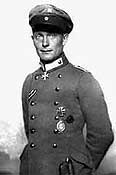
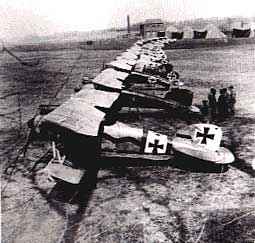
Dr Stahmer: When were you born and where?

Dr Stahmer: Give the Tribunal a short account of your life up to the outbreak of the first World War, but briefly, please.
Goering: Normal education, first a tutor at home; then cadet corps, then an active officer. A few points which are significant with relation to my later development: The position of my father as first Governor of Southwest Africa; his connections at that time, especially with two British statesmen, Cecil Rhodes and the elder Chamberlain. Then the strong attachment of my father to Bismarck; the experiences of my youth, half of which was spent in Austria to which I already felt a close attachment, as to a kindred people. At the beginning of the first World War I was a lieutenant in an infantry regiment.
Dr Stahmer: With what rank did you participate in the first World War?
Goering: As I just mentioned, at first as a lieutenant in an infantry regiment in the so-called border battles. From October 1914 on I was an aircraft observer. In June 1915 1 became a pilot, at first with a reconnaissance plane, then for a short time with a bomber and in the autumn of 1915 1 became a fighter pilot. I was seriously wounded in aerial combat. After recovery I became the leader of a fighter squadron, and after Richthofen was killed I became the commander of the then well-known "Richthofen Squadron."
Dr Stahmer: What war decorations did you receive?
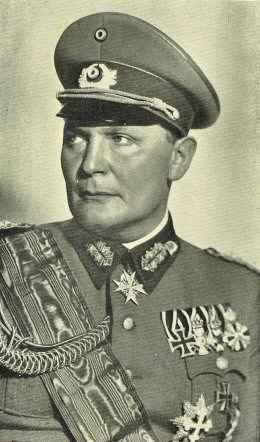
Dr Stahmer: Tell the Tribunal when and under what circumstances you came to know Hitler.
Goering: I should like to mention one basic fact in advance. After the collapse in the first World War I had to demobilize my squadron. I rejected the invitation to enter the Reichswehr because from the very beginning I was opposed in every way to the republic which had come to power through the revolution; I could not bring it into harmony with my convictions. Shortly afterwards I went abroad to find a position there. But after a few years I longed to get back to my own country. First, I spent quite some time at a hunting lodge in the mountains and studied there. In some way I wanted to participate in the fate of my country. Since I could not and would not do that as an officer for the reasons mentioned above, I had first of all to build up the necessary foundation, and I attended the University of Munich in order to study history and political science. I settled down in the neighborhood of Munich and bought a house there for my wife.
Then one day, on a Sunday in November or October of 1922, the demand having been made again by the Entente for the extradition of our military leaders, at a protest demonstration in Munich--I went to this protest demonstration as a spectator, without having any connection with it. Various speakers from parties and organizations spoke there. At the end Hitler, too, was called for. I had heard his name once before briefly and wanted to hear what he had to say. He declined to speak and it was pure coincidence that I stood nearby and heard the reasons for his refusal. He did not want to disturb the unanimity of the demonstration; he could not see himself speaking, as he put it, to these tame, bourgeois pirates. He considered it senseless to launch protests with no weight behind them. This made a deep impression on me; I was of the same opinion.
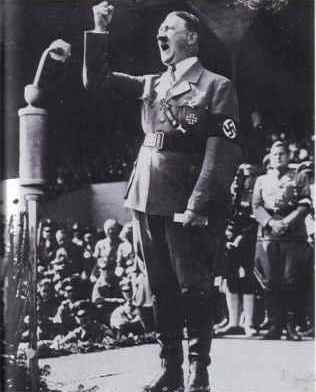
On one of the following days I went to the office of the NSDAP. At that time I knew nothing of the program of the NSDAP, and nothing further than that it was a small party. I had also investigated other parties. When the National Assembly was elected, with a then completely un-political attitude I had even voted democratic. Then, when I saw whom I had elected, I avoided politics for some time. Now, finally I saw a man here who had a clear and definite aim. I just wanted to speak to him at first to see, if I could assist him in any way. He received me at once and after I had introduced myself he said it was an extraordinary turn of fate that we should meet . . . .
Within the Party, as small as it was, he had made a special selection of these people who were convinced followers, and who were ready at any moment to devote themselves completely and unreservedly to the dissemination of our idea. He said that I knew myself how strong Marxism and communism were everywhere at the time, and that actually he had been able to make himself heard at meetings only after he had opposed one physical force disturbing the meeting with another physical force protecting the meeting; for this purpose he had created the SA. The leaders at that time were too young, and he had long been on the lookout for a leader who had distinguished himself in some way in the last war, which was only a few years ago, so that there would be the necessary authority.
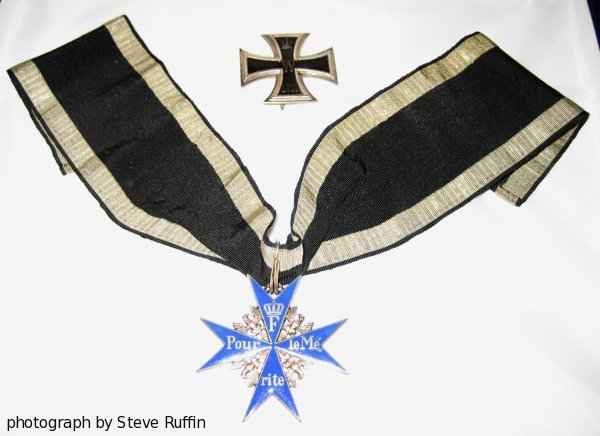
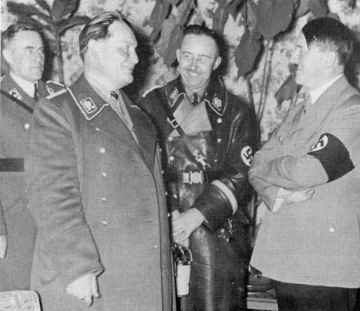




The Nuremberg Tribunal Biographies
Caution: As always, these excerpts from trial testimony should not necessarily be mistaken for fact. It should be kept in mind that they are the sometimes-desperate statements of hard-pressed defendants seeking to avoid culpability and shift responsibility from charges that, should they be found guilty, can possibly be punishable by death.
Disclaimer:The Propagander!™ includes diverse and controversial materials--such as excerpts from the writings of racists and anti-Semites--so that its readers can learn the nature and extent of hate and anti-Semitic discourse. It is our sincere belief that only the informed citizen can prevail over the ignorance of Racialist "thought." Far from approving these writings, The Propagander!™ condemns racism in all of its forms and manifestations.
Source Note: The trial portion of this material, which is available in its entirety at the outstanding Avalon and Nizkor sites, is being presented here in a catagorized form for ease of study and is not meant to supplant or replace these highly recommended sources.
Fair Use Notice: This site may contain copyrighted material the use of which has not always been specifically authorized by the copyright owner. We are making such material available in our efforts to advance understanding of historical, political, human rights, economic, democracy, scientific, environmental, and social justice issues, etc. We believe this constitutes a "fair use" of any such copyrighted material as provided for in section 107 of the US Copyright Law. In accordance with Title 17 U.S.C. Section 107, the material on this site is distributed without profit to those who have expressed a prior interest in receiving the included information for research and educational purposes. If you wish to use copyrighted material from this site for purposes of your own that go beyond 'fair use', you must obtain permission from the copyright owner.


